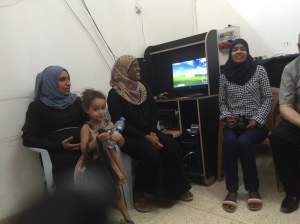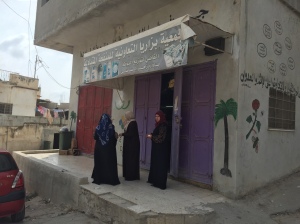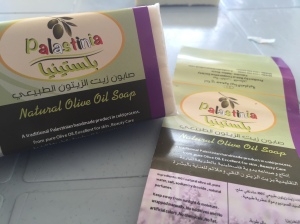There was muted excitement in the group as we set out to visit women cooperatives in the West Bank of Palestine. The previous day at the Workshop on Enhancing Role of Women in Co-operative business organized by the International Cooperative Alliance Asia and Pacific, WeEffect and the Economic and Social Development Center of Palestine, we were given statistics on women that were not wholly optimistic. While women comprised 49.2% of total population in Palestine their number in the labor force was just 19.4%. The unemployment among women was women 38.9% and that among women with 13 years of education or more was 48.7%. Further the socio-economic impact study of cooperatives in the West Bank also did not give much to go with, “Still much more is to be done, since women share in cooperatives general assemblies is merely15%, much less in the administrative committees, and only 16% of cooperatives are women cooperatives. Despite the fact that almost 60% of the productive and reproductive activities are carried out by women, especially in rural areas.”
The actual visit to women run cooperatives proved the numbers otherwise. Morhaffa from Bezaria Cooperative, Hetam Suleiman from Beita Cooperative and Fatima Awatlah from the Al Noemeh Cooperative showed the difference cooperatives were making in providing not only income and employment opportunities but also addressing social needs and providing leadership. The Supermarket run by Bezaria Cooperative earned a profit of $133,030 last year, provided regular employment to 22 women and benefited 427 families. The origin of the cooperative was in its central location to three cities, Nablus, Jenin and Tulkram. While they started as an unorganized group in 2005, through support from the government and ESDC, they organized their business, merged shops and grew their business. The cooperative now has 110 members, paid-up capital of $62,900 and equity of $192,000. It has been paying regular dividend to members and patronage benefits to the users.
According to Morhaffa, “the cooperative provides women their own space outside of their homes. This is much needed given the situation in which we are. We hope to our own building in the near future to expand not only our business but also the psychosocial services, care for people with disabilities and rent the space for community activities.” Women from the neighboring towns visit Bezaria to learn and start their own cooperatives. A reflection of cooperation among cooperatives!
The entrepreneurial spirit of the women of Beita cooperative was evident as we entered their office. The members were busy packing olive oil soaps and proudly putting stickers with their brand name Palastinia.
The cooperative when it started in 2007 was focused on agriculture and food processing, ventured into poultry and a consumer shop before finally settling on soap making. According to Hetam Suleiman, “making soap was a less risky proposition. It is a traditional product, the soap making process is familiar and it gives more work opportunity for women.” The other women in the group added, “the soap making in the initial days was in a traditional way – big size soap, without added ingredients and no packaging. We realized that in order to grow we needed to be more skilled, experiment with ingredients, focus on quality and make the packaging attractive. Brand Palastina was thus born.” The cooperative in addition to direct selling also makes soaps for private sellers. They realize that selling directly in foreign markets will give them more profits and have started this in earnest – investing in new equipment, adding to the workforce, investing in attractive packaging and reaching out to newer markets.
 The first thing one notices as one enters the Al Noemeh Cooperative for Rural Development are the rows of computers lined against the wall. The cooperative provides training to women to become computer literate. This cooperative which started in 2000 also had a learning curving, investing in many activities before settling in on the cooperative shop. A unique service the cooperative provides its members is the opportunity to pay and load their electricity cards. The cooperative negotiate with the department to set up a card reader in their shop. Community members can come to the cooperative shop and reload their card rather than go to the city. 416 families benefit from this service and the cooperative estimates it has saved $31,405 in terms of money and 3,744 hours in terms of time! According to the Fatima, the chair, “we are the only cooperative that provides this service to its members and community. While the member waits for their card to reload they also purchase goods from the store. Our business has increased!”
The first thing one notices as one enters the Al Noemeh Cooperative for Rural Development are the rows of computers lined against the wall. The cooperative provides training to women to become computer literate. This cooperative which started in 2000 also had a learning curving, investing in many activities before settling in on the cooperative shop. A unique service the cooperative provides its members is the opportunity to pay and load their electricity cards. The cooperative negotiate with the department to set up a card reader in their shop. Community members can come to the cooperative shop and reload their card rather than go to the city. 416 families benefit from this service and the cooperative estimates it has saved $31,405 in terms of money and 3,744 hours in terms of time! According to the Fatima, the chair, “we are the only cooperative that provides this service to its members and community. While the member waits for their card to reload they also purchase goods from the store. Our business has increased!”
According to UN Women, “women experience particular disadvantage in the occupied territories, where already-protective traditional attitudes are intensified by other daily restrictions. Male education is commonly prioritized, much of the limited paid work goes to men, and women are largely expected to live in the private sphere, focused on unpaid domestic tasks. Although the female literacy rate has improved in recent years, Palestine still lags on the global scale, with the numbers of illiterate women four times higher than those of men.” In their report, Building Ties: Towards Integrated Strategic & Policies for Empowering Palestinian Women, they recommend strengthening cooperatives and women run collective ventures. Collective economic ventures, cooperatives and credit cooperatives are important ways to enable women to overcome the trap of the informal sector and small business competition. These cooperatives can provide male and female participants with the capabilities to improve their skills through combining experiences and providing training and markets for marketing activities. In addition, young producers and manufacturers can exert pressure on decision-makers through joint efforts. These recommendations also resonate with those in the ICA-ILO report, Advancing gender equality: The co-operative way. The recommendations include developing and implementing gender equality strategies, tools and resources more broadly to facilitate the equal participation of women throughout the co-operative movement; providing women in emerging and marginalized co-operatives with financial and technical support through co-operation among co-operatives; working with government and other partners to overcome cultural and structural barriers for women; gathering and sharing more information about best practices and lessons learned; and tracking equality indicators such as women’s participation in governance, management, membership, asset ownership and income parity on an on-going basis to ensure accountability.
The workshop focused on Enhancing Role of Women in Co-operative business was to bring the spotlight on women run cooperatives in Palestine. It brought together the Ministry, International Development agencies and cooperatives from Palestine and outside together to discuss the issues and share experiences.
The first line, muted excitement was not totally correct! For the group consisting of cooperators from India, Kenya, Philippines and the U.S., this was the first visit to Palestine. The rich history of the region (places only seen printed in history books), the conflicted politics and its lingering impasse, and the anguished lament of the people was all very moving. The excitement was palpable and interaction with the women cooperatives did not disappoint!
References:
Building Ties: Towards Integrated Strategic & Policies for Empowering Palestinian Women. http://palestine.unwomen.org/en/digital-library/publications/2014/6/building-ties#sthash.H7FhiQN7.dpuf
Advancing gender equality: The co-operative way
http://www.ilo.org/empent/units/cooperatives/WCMS_379095/lang–en/index.htm
The Socio-economic impact of co-operatives in the West Bank
http://www.esdc-pal.org/index.php/publications-menu/publications-b


